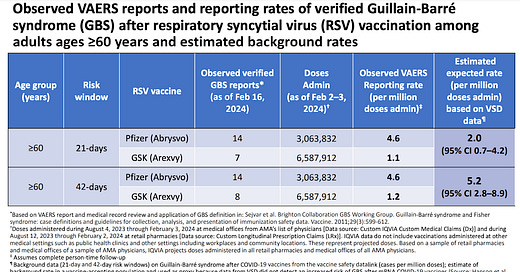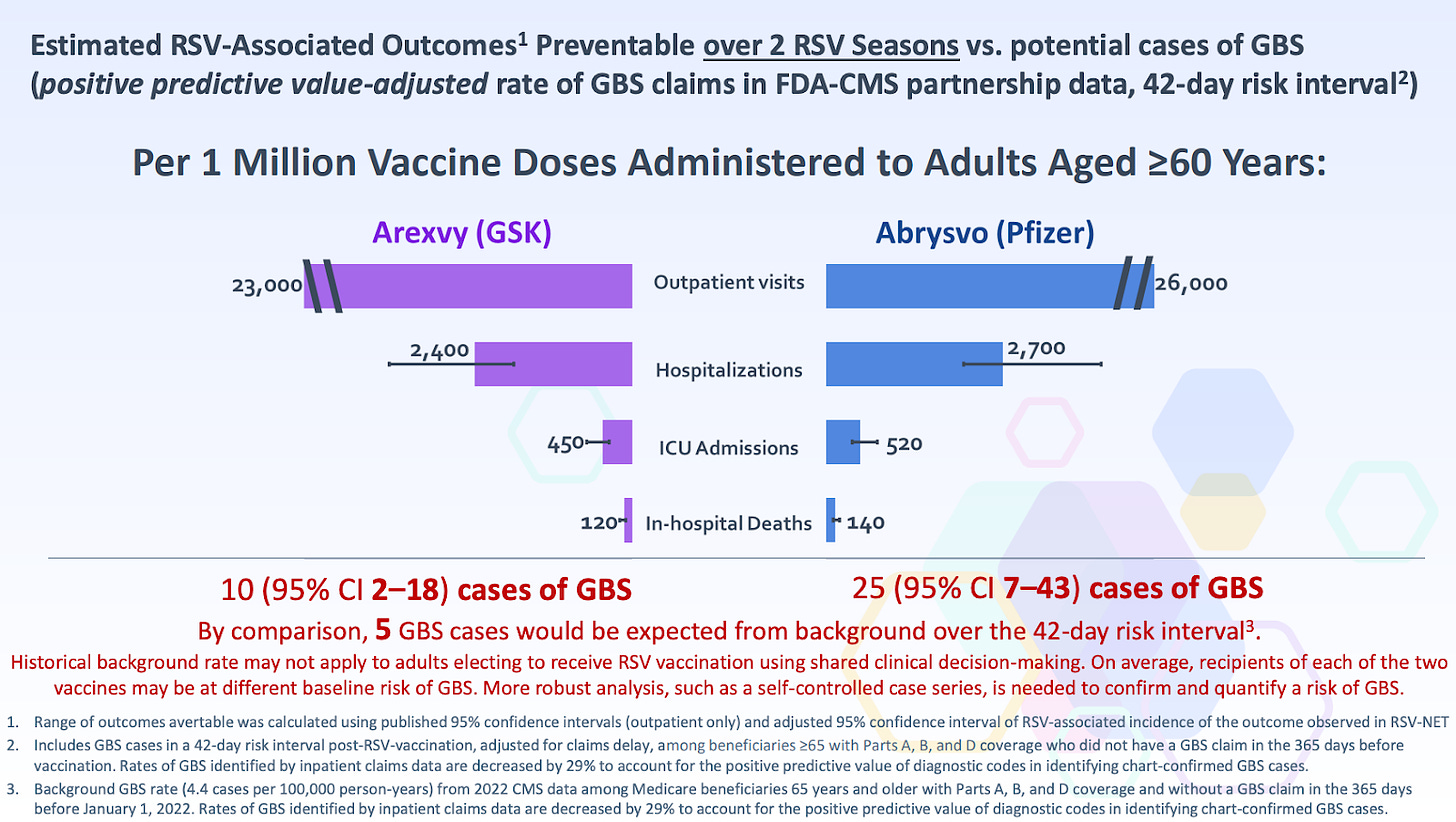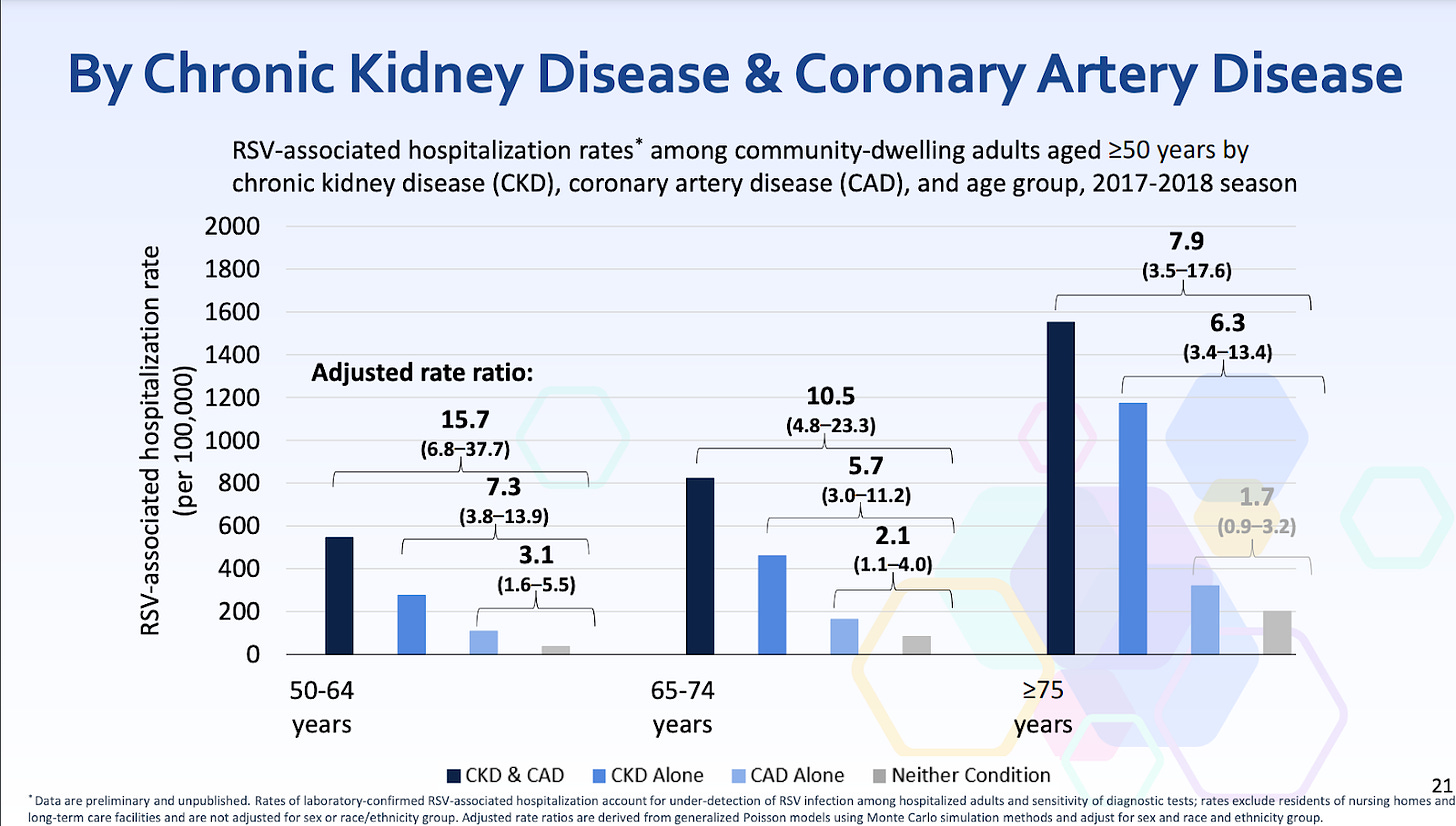ACIP Cliff Notes: Feb 29 (RSV)
True safety signal detected, but benefits still outweigh risks
Today was the second day of ACIP. YLE tuned in for the discussion on adult RSV vaccines.
This was the first-ever respiratory virus season where we had RSV vaccines for older adults, pregnant people, and babies. This was a huge step in the right direction. However, we had one big, unanswered question among older adults:
Is there a “true” safety signal, and if so, do the vaccine’s benefits still outweigh the risks?
What does the real-world data show?
During the clinical trial, a rare safety signal was detected: Guillain-Barré Syndrome. This is when the immune system attacks nerves, which is usually mild but can be devastating. However, we couldn’t tell if it was a true safety signal or random noise in the data. Unfortunately, clinical trials aren’t big enough to detect confidently.
So, CDC followed real-world data from three separate safety surveillance systems after the rollout. This is what they found:
There is a true safety signal after receiving the RSV older adult vaccine, particularly after the Pfizer vaccine.
There were 21 cases of GBS (out of 9,500,000 vaccinations). This is likely an underestimate of the “true” rate because there’s typically underreporting of these surveillance systems.
This is more than two times higher than the “background rate”—2 cases per 1 million are expected regardless of vaccination.
So, do the benefits still outweigh the risks for older adults?
In short, yes.
CDC provided a helpful analysis. They estimated the disease prevented per 1 million vaccines compared to the risks of GBS. They found:
RSV vaccine prevented 23,000-26,000 outpatient visits, ~2,500 hospitalizations, hundreds of ICU admissions, and 100-200 deaths among older adults.
These benefits hold across all older age groups, although they were far more beneficial among those over 75.
This is compared to 10-25 cases of GBS.
Other nuggets
Moderna is entering the game. This past season, there were two vaccines available: Pfizer and GSK. However, Moderna is now throwing its hat in the ring and using a different vaccine platform—mRNA. The Moderna vaccine looks to wane faster but is safer (no cases of GBS). Moderna’s vaccine hasn’t been approved by FDA yet, but this may make it complicated to choose what vaccine to select in the future.
Chronic kidney disease is hugely impactful on RSV severe disease, which was surprising but may be helpful if you’re on the fence about the vaccine and have CKD.
RSV vaccines are slow to wane, but we are following this in real time. So far, they offer “okay” protection in the second season (about 50-70% efficacy compared to the ~85% in the first season). Also, in one study, a second dose during the second season didn’t seem to do much to boost protection. So, if you got an RSV vaccine last season, you may not need one this upcoming fall, but this remains “officially” unknown.
Bottom line
RSV vaccines for older adults are a good call, as the benefits exceed the risks. If you haven’t gotten your vaccine (and are eligible), really consider it next season and talk with your clinical care provider.
Love, YLE and Andrea
P.S. Whenever I listen to an ACIP meeting, it gives me confidence in how seriously CDC, physicians, and scientists take vaccine safety. I wish the general public could see it, given the growing vaccine skepticism and loss of trust.
Andrea Tamayo is an intern at YLE. She is a science journalist and master’s student at the University of California, Santa Cruz Science Communication Program. You can find more of her stories at andreactamayo.com.
“Your Local Epidemiologist (YLE)” is written by Dr. Katelyn Jetelina, M.P.H. Ph.D.—an epidemiologist, wife, and mom of two little girls. During the day, she is a senior scientific consultant to several organizations, including CDC. At night, she writes this newsletter. Her main goal is to “translate” the ever-evolving public health world so that people will be well-equipped to make evidence-based decisions. This newsletter is free, thanks to the generous support of fellow YLE community members. To support this effort, subscribe below:









what is a safety signal???
Could you explain more clearly for a layman the sentence “Chronic kidney disease is hugely impactful on RSV severe disease, which was surprising but may be helpful if you’re on the fence about the vaccine and have CKD”. As I have CKD as many older adults do. Tim